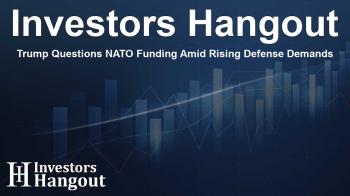Trump Questions NATO Funding Amid Rising Defense Demands

Trump's Perspective on NATO Funding
Recently, there has been a significant discussion surrounding the United States' financial contributions to NATO. U.S. President Donald Trump has openly expressed doubts about whether the country should continue its current spending levels on the North Atlantic Treaty Organization. Speaking to reporters, he highlighted that while the U.S. provides protection to NATO allies, he feels that they are falling short in terms of reciprocation.
Demand for Increased Defense Spending
President Trump has consistently urged NATO member countries to increase their defense budgets significantly. For years, NATO has had a guideline for members to allocate at least 2% of their gross domestic product (GDP) towards defense. However, many nations have struggled to meet this expectation. Trump’s recent statements reflect a growing frustration over this issue.
The Proposed 5% Target
Trump believes that NATO allies should be spending as much as 5% of their GDP on defense initiatives. This proposed change represents a substantial increase from the current target of 2%. Remarkably, no NATO country, including the United States, reaches this ambitious spending goal. This suggests that the current funding levels might not adequately address the potential defense challenges facing the alliance.
The Significance of NATO
NATO, established in the aftermath of World War II, plays a crucial role in global security. It binds member countries in a mutual defense pact, compelling them to work collaboratively for collective security. Trump's remarks raise important questions about the future effectiveness and funding priorities of the alliance, especially as geopolitical tensions continue to heighten.
Reactions from NATO Allies
Reactions to Trump's statements have been mixed. Some NATO allies acknowledge the need for increased military spending, especially in light of evolving global security threats. On the other hand, others are concerned that such a large increase could strain their national budgets and create internal political challenges.
Addressing Security Challenges
Moreover, transitioning to higher spending may not yield immediate results in terms of security enhancement. The complexities of defense spending involve long-term planning, infrastructure, and personnel training. Thus, while the demand for increased contributions is clear, the implementation of such significant hikes requires careful consideration and planning by each member nation.
The Future of NATO
As the international landscape evolves, NATO’s role and funding mechanisms may also need revision. Discussions surrounding defense spending could serve as a catalyst for broader reforms within the alliance. The challenge lies not only in increasing budgets but also in ensuring that these funds are effectively utilized to enhance collective security.
Frequently Asked Questions
Why is President Trump questioning NATO funding?
Trump believes that NATO members are not adequately supporting U.S. defense efforts despite receiving protection from the U.S.
What is the current defense spending guideline for NATO members?
NATO has set a guideline for members to spend at least 2% of their GDP on defense, though many do not meet this target.
What does Trump propose for NATO members' defense spending?
Trump has proposed that NATO members increase their defense spending to 5% of GDP, significantly higher than the current 2% guideline.
How has NATO responded to Trump's demands?
Reactions have varied among NATO allies, with some agreeing on the need for higher spending while others express concern over budget constraints.
What implications does this have for NATO's future?
The ongoing discussion about defense spending could lead to significant changes in how NATO operates and allocates its resources moving forward.
About The Author
Contact Dominic Sanders privately here. Or send an email with ATTN: Dominic Sanders as the subject to contact@investorshangout.com.
About Investors Hangout
Investors Hangout is a leading online stock forum for financial discussion and learning, offering a wide range of free tools and resources. It draws in traders of all levels, who exchange market knowledge, investigate trading tactics, and keep an eye on industry developments in real time. Featuring financial articles, stock message boards, quotes, charts, company profiles, and live news updates. Through cooperative learning and a wealth of informational resources, it helps users from novices creating their first portfolios to experts honing their techniques. Join Investors Hangout today: https://investorshangout.com/
The content of this article is based on factual, publicly available information and does not represent legal, financial, or investment advice. Investors Hangout does not offer financial advice, and the author is not a licensed financial advisor. Consult a qualified advisor before making any financial or investment decisions based on this article. This article should not be considered advice to purchase, sell, or hold any securities or other investments. If any of the material provided here is inaccurate, please contact us for corrections.

